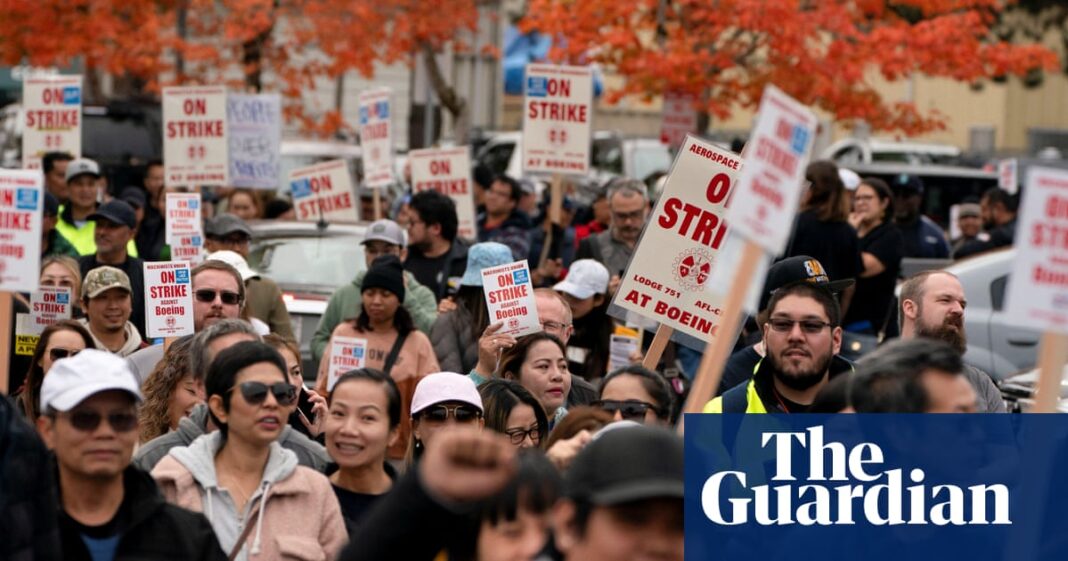Boeing workers late on Wednesday rejected the latest offer to end the more than a month-long strike that has crippled the already struggling manufacturing giant.
In a blow to Boeing and the Biden administration, which has fought for a resolution to the dispute, 64% of the 33,000 members of the International Association of Machinists and Aerospace Workers union voted to reject the contract, the union said late on Wednesday.
“After 10 years of sacrifices, we still have ground to make up, and we’re hopeful to do so by resuming negotiations promptly,” leaders of the union said in a statement after votes were tallied.
The news came on the same day that the new CEO, Kelly Ortberg, said he would “fundamentally” transform the culture inside the beleaguered aerospace giant, and announced Boeing’s quarterly losses had swelled to almost $6bn.
The company’s shares fell 2.7% in US pre-market trading on Thursday morning after the workers voted in a strong majority to extend the nearly six-week-long strike, adding fresh uncertainty to Boeing’s efforts to stabilize finances and restore its battered image.
The workers represented by the union began striking on 13 September.
The latest contract proposal included a 35% wage increase over the four-year contract, reinstatement of incentive bonuses, increases to the company 401k match – though workers were pushing to bring back pensions that were lost as concessionary in previous contracts, and a $7,000 ratification bonus.
After weeks of tense negotiations, a deal had appeared to be in the offing over the weekend.
“With the help of acting US secretary of labor Julie Su, we have received a negotiated proposal and resolution to end the strike, and it warrants presenting to the members and is worthy of your consideration,” the union’s bargaining committee said in a statement to members on 19 October. “We are finalizing the strike settlement agreement, which will be completed soon, along with additional contract details to provide you with a clear understanding of the offer.”
Workers also rejected an initial tentative agreement in early September. Talks resumed with a federal mediator on 7 October after a two-week stalemate. But those talks quickly broke down as Boeing suspended negotiations with the union and withdrew the offer that included a 30% wage increase.
On 1 October, employee healthcare benefits for Boeing workers on strike were cut off by the company. The union noted workers had been engaging with the community for striking members to work temporary jobs in addition to the strike pay of $250 a week members have been receiving since the third week of the strike.
Boeing had also announced plans to layoff 17,000 workers as part of plans for a 10% work reduction at its commercial unit for union and non-union workers.
after newsletter promotion
According to a recent analysis by the Anderson Economic Group, the strike cost an estimated $7.6bn in direct economic losses, including $4.35bn for Boeing and nearly $2bn for Boeing suppliers.
“Boeing is going to have to settle it and just make a higher offer, because they are just not in a position to duke it out,” said the banking analyst Nick Cunningham at Agency Partners.
Analysts said the vote could influence efforts to carry out a re-financing needed to stabilize its operations after the strike hampered Boeing’s recovery from a string of previous crises. Many suppliers are also facing financial difficulties.
Even before the vote by 33,000 striking workers, the Boeing chief financial officer, Brian West, surprised analysts on Wednesday by acknowledging that the company would continue to bleed cash in 2025.
Reuters contributed reporting


